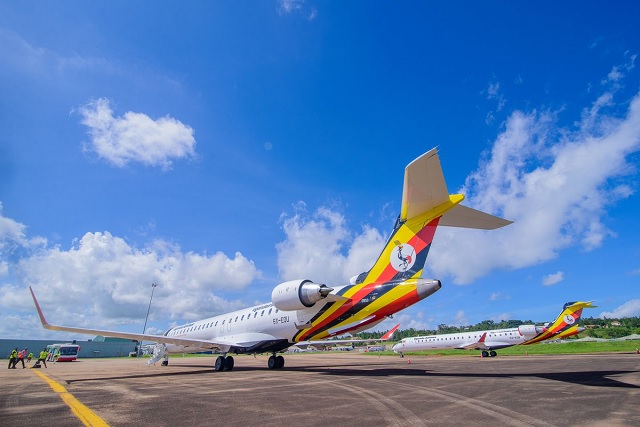
Kampala, Uganda | THE INDEPENDENT | Managers of different airlines say the temporary suspension of passenger flights in and out of Uganda will have drastic effects on their operations and revenues.
They however welcome the move because they say it will safeguard people as governments and individuals set up measures to combat the spread of the coronavirus.
Over a week ago President Yoweri Yoweri Museveni suspended all incoming and outgoing passenger flights to Uganda in a bid to combat the spread of COVID-19.
Museveni however exempted emergency and cargo flights.
As result of the presidential directive, Entebbe International Airport is in a partial shutdown, something that has not only affected restaurant, airport taxi operators but also the air operators.
There are 17 air operating companies in Uganda. These include;, Uganda Airlines, KLM, Turkish Airlines, Eagle Air and Rwandair and Ethiopian Airlines among others.
The Country Manager of Eagle Air, Tony Rubombora says that the aviation industry had already started feeling the pinch because the European Union and United States of America among others had began shutting down their airports to curb travelers from importing coronavirus.
The disease emerged from the Chinese city of Wuhan last December and has spread to over 180 countries and areas globally. Early this month, China discharged it’s last confirmed case from hospital. However a few days after, it confirmed some cases, which were all imported by travelers.
The aviation industry has been one of the most hit sectors or businesses following the outbreak of the COVID-19 pandemic. Rubombora says that it’s impact on the industry is yet to be measured and quantified. He however projects that the pandemic will have a catastrophic impact on the industry and that there will be need to discuss how to revive the industry when the pandemic has been contained and overcome.
Managers of some of the airlines agree with Rubombora including the Head of Marketing for Uganda Airlines, Deo Nyanzi and Emmanuel Onyango of Emirates.
Nyanzi says that the airline will assess the impact of the pandemic and Entebbe shutdown at a later date. However, all four CRJ900 Bombardier aircrafts are parked at the airport and staff are working from home.
Onyango, speaking on behalf of Emirates says that it is also still early to assess how the pandemic has impacted on the aviation industry and Emirates in particular. He said all staff apart from the cargo manager and crews are working from home as a precautionary measure against COVID-19.
However, Rubombora says Eagle Air is already feeling the pinch days into the partial shutdown of the airport.
Though he does not disclose how much money the airline has been making in previous years, Rubombora says the company will make losses because it has fixed operational costs such as staff salaries and has to service it’s aircrafts. To cut costs, Rubombora says that he has to send some staff on unpaid leave.
The company, which operates both passenger and cargo flights within the East African region also has to meet it’s obligation of paying interests on bank loans.
For instance, the airline sets aside $150,000 US Dollars (about 562 million) every month for renewing certain components of it’s aircrafts, pay about $300,000 US Dollars ( about Shs 1.1 bilion) to service bank loans.
Though Eagle Air is operating cargo flights at the moment, Rubombora says the company has to incur additional costs of paying $2300 US Dollars (about 8.6 million) for each crew member because they must be admitted for institutional quarantine.
He is thereby urging the government to ask banks to freeze interest payment on loans or it should consider giving interest free loans to players in the aviation industry.
Meanwhile, Civil Aviation Authority (CAA) Spokesperson Vianney Luggya says that the authority will also be hit by the effects of the pandemic on the aviation industry. However, the impact of the pandemic on aviation is yet to be determined.
Luggya says CAA is already feeling the pinch from the loss of revenue sources such as landing and parking fees and also declining passenger numbers since January this year.
CAA collected shillings 196.9 billion in revenues in financial year 2015/2016 up from shillings 157 billion in the previous financial year mostly from flights. The flights fetched a total of shilling 154 billion in the 2015/2016 period mainly from domestic and international passenger service charges.
Entebbe International Airport traffic performance for the 2015/2016 financial year showed that international passenger numbers were 1.3 million and rose to about 1.8 million by end of June 2019.
According to the 2020/2021 Ministerial Policy Statement for Works, CAA plans to handle 1.9 million passengers at Entebbe Airport and collect a total of shillings 296 billion from mainly fees, charges and ground rent.
Luggya says that the pandemic will however affect the aviation industry and as result CAA might not collect revenue as projected. He however says the problem will affect the rest of the global economy and that it will hit mainly food security, tourism flows as well as air travel.
CAA’s business plan 2017/2018 to 2021/2022 indicates that the authority will endeavor to stimulate air traffic through various strategies and for a (Africa and world routes), to utilize the upgraded, expanded and improved Entebbe International Airport infrastructure among other efforts.
******
URN
 The Independent Uganda: You get the Truth we Pay the Price
The Independent Uganda: You get the Truth we Pay the Price



